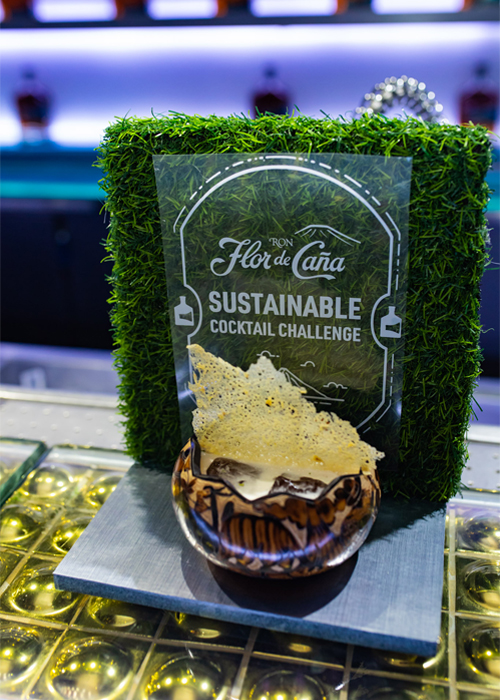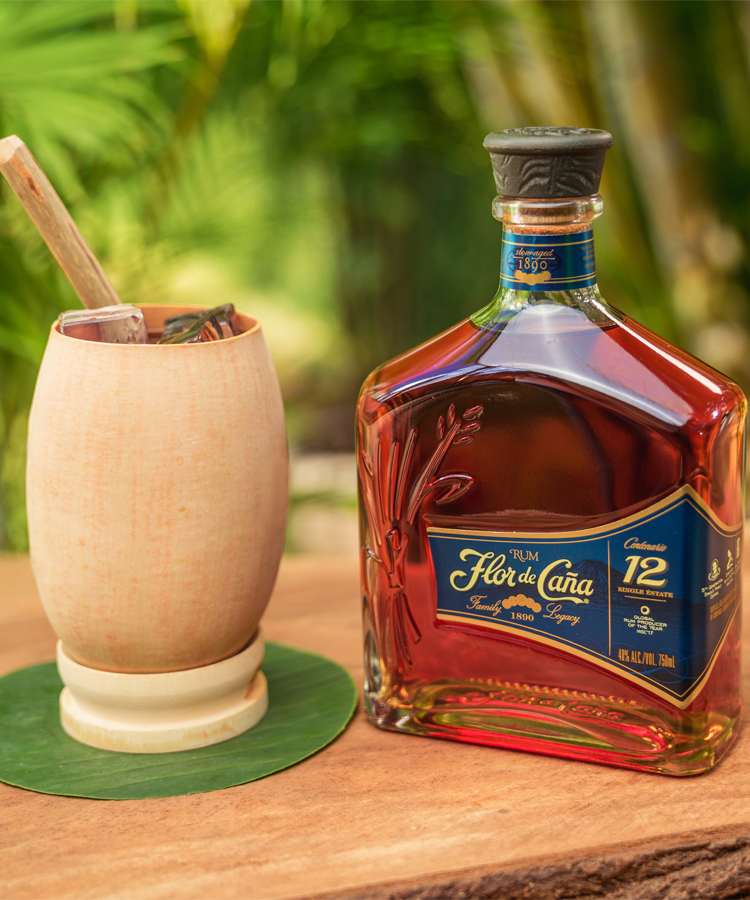
Near the base of the San Cristóbal volcano in northwestern Nicaragua sits the Flor de Caña rum distillery. This fifth-generation, family-owned business has been making rum since it was founded in 1890 by Alfredo Francisco Pellas Canessa, an Italian immigrant. Today, the distillery’s core lineup consists of both light and dark rum expressions, aged naturally (with no added sugar) between four and 25 years in white oak ex-bourbon barrels that are sealed with plantain leaves.
Flor de Caña, named “Best Rum Producer of the Year” in 2017 by the IWSC, is a leader when it comes to sustainability. This issue has never been more important in the spirits industry, as producers, distillers, and even bartenders look for ways to reduce waste and recycle as much as possible.
Flor de Caña employs an array of practices that are meant to help preserve the environment that is so crucial to the quality of its rum. “Sustainability is embedded deep in our brand’s DNA,” says global brand ambassador Mauricio Solórzano. “It’s been part of the founding family’s core values since the early days of Flor de Caña, passed down from generation to generation.” Flor de Caña has been a Fair Trade Certified Aged product since 2017, which requires compliance with over 300 different labor, social, and environmental practices.
“Our focus on sustainability covers every step of the process,” says Solórzano, “from the harvesting of the sugar cane, to the fermentation process, the distillation process, and, finally, a natural aging process without sugar, artificial ingredients, or any sorts of additives.”
All the sugarcane used to make Flor de Caña is grown on the distillery’s own estate, which means that every step — from planting to harvesting — remains under its control. The cane is processed in the only mill in the world that’s certified sustainable by both Bonsucro and Fair Trade. To reduce its carbon footprint, Flor de Caña captures any CO2 released during fermentation and recycles it by selling it to the brewery and soft drinks industries in Central America. Also, for the past decade, the distillery has been powered using 100 percent renewable energy that comes from byproducts of the distillation process. “We basically use the leftover residue of the squeezed sugar cane, known as bagasse, and burn it to produce steam which powers a turbine that generates electricity,” says Solórzano.

One effort Solórzano is particularly proud of is that, since 2005, Flor de Caña has planted 50,000 cedar, oak, and other native trees annually (almost 700,000 to date) around the distillery. This ensures that the verdant environment, including the base of the San Cristóbal volcano just five miles away, remains pristine. Water used at the distillery is treated and reused, saving millions of gallons every year. In addition, Flor de Caña recycles hundreds of tons of cardboard, glass, plastic and paper annually.
The focus on sustainability is not just on the environment, as Flor de Caña provides essential services to its employees as well. Since 1913, the children of hundreds of employees have been provided with free education. And since 1958, healthcare has been provided for free to employees and their families, including over 400 surgeries and 170 births on average per year. In addition, sales of Flor de Caña rum help support the distillery’s workers through the Fair Trade Community Development Fund, which gives money directly to the workers who can then decide what it should be spent on in their community.
The health and well-being of Nicaragua at large is important to Flor de Caña as well. For nearly three decades, the distillery has supported APROQUEN, a nonprofit that has helped more than half a million children who are burn victims or suffer from cleft lip or palate. The distillery has also supported the American Nicaraguan Foundation, an organization dedicated to helping to alleviate poverty in Nicaragua, for nearly 15 years.
As a way of celebrating this historic commitment to sustainability and sharing these values with the global bartending community, Flor de Caña broke ground by launching the Sustainable Cocktail Challenge. The competition challenges bartenders to create spectacular cocktails while using sustainable ingredients and being eco-conscious. The global finale will take place in Nicaragua further along in 2020 with participants from over 40 countries.
Flor de Caña rum is a working example that proves that sustainable production methods and premium spirits are not mutually exclusive; in fact, just the opposite. The towering volcano, fertile soil, and emerald forests that make up the natural environment surrounding the distillery are all in the DNA of the rum, something that Flor de Caña does not take for granted. By ensuring that its carbon footprint is reduced as much as possible, and its workers are treated fairly, Flor de Caña will be able to distill and age its natural, premium rum for generations to come.
This article is sponsored by Flor de Caña.

